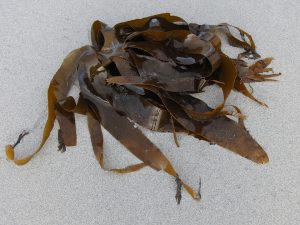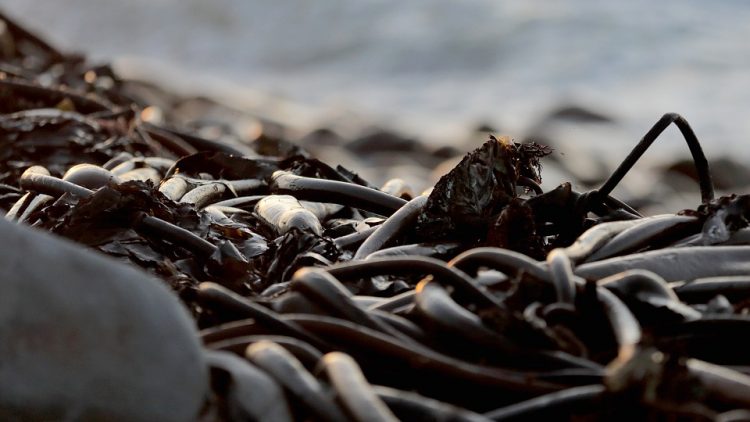Kelp seaweed, a rich natural source of iodine, is theorized to help weight loss via thyroid-supportive activity.

Kelp is a type of seaweed that contains many minerals, vitamins and antioxidants that are valued for their health benefits. In addition, kelp has been suggested as a weight loss supplement due to its potential ability to:
- Help generate heat and oxidize fatty acids. Some research suggests that a common carotenoid in bladderwrack, a type of seaweed similar to kelp, can create heat and oxidize fatty acids in abdominal tissue fat.
- Stimulate the thyroid gland. Seaweeds are believed to increase the production of thyroid hormones and stimulate thyroid function, which could result in a higher metabolic rate.
Overview
Kelp is a class of seaweeds that spans several brown seaweed species in the order Laminariales. Found beneath the surface of shallow ocean regions in what are referred to as “kelp forests,” they are known for their very fast growth rate – up to half of a meter per day. At their peak, they can reach approximately 30 to 80 meters.
Seaweed has been a part of human diets for years, with its earliest recorded use in the form of a poem that is believed to date to AD563 in Scotland. It is thought to have played a key part of the diets of coastal dwellers in Ireland and Scotland for at least 4,000 years, typically consumed with oatmeal or boiled and tossed into a butter dish for its magnesium, iodine, potassium, iron and calcium content.
As a source of iodine, kelp influences the production of thyroid hormones, which are essential for the proper metabolism of cells in the human body. Although the introduction of iodized salt into the modern human diet means that kelp is not as important as it once was and even unnecessary for many, it is a source of various other minerals and has also been suggested to be an effective fat burner due to its connection to thyroid activity.

How Kelp Might Help With Weight Loss
Heat generation and fatty acid oxidation
Research suggests that fucoxanthin, one of the primary carotenoids found in bladderwrack, possesses anti-obesity effects due to its ability to induce the oxidation of fatty acids and the generation of heat in the white adipose tissue of the abdomen.1 In addition, numerous animal studies suggest that various seaweeds can reduce weight gain in animals that consume a high-fat diet.2 It is possible that these weight reductions could stem from the oxidation of fatty acids and creation of heat as observed in the study above.
Thyroid stimulation
Thyroid hormones regulate numerous bodily processes, including metabolism, and a lack of these hormones slows down every bodily system. Individuals lacking thyroid hormones have underactive thyroids and typically experience fatigue and weight gain. Although human studies are scarce, the potential of kelp to stimulate thyroid function could lead to weight loss through an increase in metabolic rate. One documented study that supports this notion found that seaweed led to a significant increase in thyroid-stimulating hormone in postmenopausal women.3 7-keto has also been suggested as a fat burner due to its ability to support thyroid activity and boost resting metabolic rate.
Kelp Benefits, Popular Uses and Reputation for Fat Burning
Many individuals take kelp to help promote thyroid function and lose weight. Despite these common uses, little evidence exists to conclusively determine kelp’s effectiveness as a fat burner. However, numerous studies have shown the promise of various components and extracts in kelp in terms of fat burning and reducing weight. In addition, research has suggested that kelp could be a beneficial dietary supplement for those with lifestyle-related diseases such as diabetes.
Research
Animal Research
Laminaria japonica kelp might have preventative effects on obesity and diabetes
A review of Laminaria japonica, a type of kelp common in Japanese foods, examines recent reports on its ability to prevent diabetes and obesity. In particular, animal studies examined its effects on both mice that were loaded with triglycerides and mice with obesity that was induced by a high-fat diet. The results of these experiments suggest potential for L. japonica in the prevention of obesity and diabetes and suggest its alginic acid as the main reason for these effects. Other experiments examined the ability of Laminaria hot water extract to prevent high blood sugar levels in both mice loaded with carbohydrates and in-vitro Caco-2 cells.
- The researchers suggest that Laminaria kelp “may be useful for preventing lifestyle-related diseases” and that further examination of its potential at “different processing methods and/or growth stages” should be pursued.4
Human Research
Common bladderwrack carotenoid could have anti-obesity effects
A review of numerous studies examined the potential of bladderwrack, a seaweed similar to kelp, in the targeting of molecular pathways that can aid in the prevention of diabetes and obesity. The researchers suggest that fucoxanthin, a common carotenoid found in seaweeds, induces UCP1 (uncoupling protein 1) in WAT (white adipose tissue) located in the abdomen, in turn oxidizing fatty acids and prompting the production of heat in this region. In addition, fucoxanthin has been shown to lower blood sugar levels and increase resistance to insulin by acting on secretions of cytokine stemming from WAT.
- The researchers suggest that the fucoxanthin found in kelp could have preventative effects on obesity and that “the key structure of carotenoids for the expression of anti-obesity effect is suggested to be the carotenoid end of the polyene chromophore.”5
Ecklonia cava (72 mg and 144 mg) polyphenols might be effective at reducing body fat
In order to determine the effects of polyphenols extracted from the brown seaweed kelp ECP (Ecklonia cava) on body weight, BMI (body mass index), waist circumference and body fat ratio, a team of researchers examined the effects of a twelve weeks of supplementation with the extract on 97 overweight female and male adults. The double-blind study was randomized, placebo-controlled and utilized a parallel-group design consisting of three groups: a placebo group, a low dose group (seventy-two milligrams of ECP daily) and a high dose group (one-hundred-and-forty-four milligrams of ECP daily). After the twelve-week period, the subjects that received the polyphenol extract showed decreases in body mass index, waist circumference, body fat ratio, hip/waist ratio, total cholesterol, LDL (low-density lipoprotein) cholesterol, total cholesterol/HDL(high-density lipoprotein cholesterol) and AI (atherogenic index) compared to the group that received a placebo. Furthermore, the high dose group experienced reductions in blood sugar and systolic blood pressure.
- With these results, researchers concluded that “ECP supplementation significantly contributed to lowering body fat and serum lipid parameters such as total and LDL cholesterols with dose dependence,” and called for additional studies on the effects of polyphenols extracted from ECP.6
Undaria pinnatifida (4 to 6 grams per day) might aid those with metabolic syndrome
In order to determine the effects of the Asian kelp Undaria pinnatifida, researchers conducted a double-blind, randomized and placebo-controlled trial on thirteen men and fourteen women that exhibited at least one symptom of metabolic syndrome, which consists of a group of conditions including high waist fat levels, increased blood sugar levels and high body fat. The participants were divided into two groups: one consumed a placebo for one month followed by one month of four grams per day of kelp, and the second consumed four grams of kelp per day for one month followed by six grams of kelp per day for one month. Measurements of weight, blood pressure, waist circumference, lipids and biomarkers of inflammation were measured each month. The results revealed that in women subjects, waist circumference decreased significantly. In addition, systolic blood pressure was reduced after one month of consuming six grams of kelp per day in the second group.
- The Researchers concluded that consuming approximately four to six grams of seaweed per day, which is fairly common for diets in Japan, “may be associated with low metabolic syndrome prevalence.”7
Ascophyllum nodosum enriched bread (4%) might decrease energy intake
To determine the effect of kelp isolates on energy intake, a team of researchers enriched bread with Ascophyllum nodosum, also known as Norwegian kelp, and observed its effect on the intake of energy and absorption of nutrients in overweight males. The crossover trial was single-blind and examined twelve males that were divided into two groups: one that consumed a breakfast meal that consisted of the enriched bread with four percent A. nodosum, and the other a control group that ate a breakfast with bread that did not contain any A. nodosum. Four hours after the meal, another meal was consumed and energy intake was measured. The results revealed a significant decrease in the intake of energy in the group that ate the enriched bread compared to the control group.
- The results suggest that kelp-enriched bread could help minimize energy intake, a property that could have beneficial effects for weight loss, although the researchers suggest that “further investigation of potential mechanisms of action is warranted.”8
Dosage for Fat Burning
- 72 mg and 144 mg were both effective daily doses for reducing body fat
- 4 to 6 grams per day showed benefits in Asian women with metabolic syndrome
- Single-ingredient supplements typically contain 200 to 400 mg of kelp
- Kelp capsules with additional ingredients typically come in 500 mg doses
Side Effects
Kelp contains iodine, which in high enough dosages can interfere with thyroid function. In other words, the same thyroid-activating effects that may help with weight loss may also worsen overactive thyroid problems. For this reason, those with thyroid problems should consult their doctor prior to taking kelp supplements.
Daily Iodine Maximums
Always check the amount of iodine in your kelp supplements to determine that you’re not going over your daily recommended dosage. This may be especially important for those with thyroid health concerns.
- Infants. 45 mcg
- Children <4 years. 105 mcg
- Adults and Children >4 years. 225 mcg
- Pregnant or Lactating Women. 300 mcg
Available Forms
Raw kelp has been around for years and made its way into various dishes and teas. Here are the three most common forms that you can use today:
- Raw. For those that enjoy seaweed, kelp in its raw form can be added to your meal.
- Capsule. Capsules are an easy way to consume kelp, although iodine dosages vary by brand, so make sure to check the quantity to ensure that you don’t exceed the daily recommendation.
- Tea. If you enjoy the taste of seaweed, kelp can be added to boiling water and used to make tea.
Supplements in Review Recommendation
- Kelp, 200 to 400 mg
Kelp, and seaweeds in general, have shown potential for reducing body fat. Research is early and suggestive, however, and requires more extensive, well-designed human studies. Regardless, in theory, kelp’s influence on thyroid function appears promising for helping with the weight gain that sometimes occurs with underactive thyroid function.
200 to 400 mg is the most common dosage range for kelp capsules. However, keep in mind that kelp dosage is different than iodine dosage – 225 mcg per day of iodine is the recommended maximum for adults. Always check the label for each brand that you use.
References
Leave a Reply